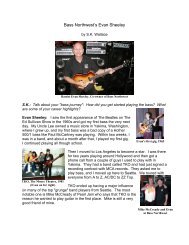
YUMPU automatically turns print PDFs into web optimized ePapers that Google loves.

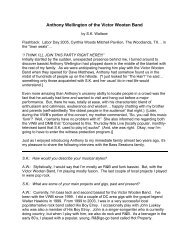
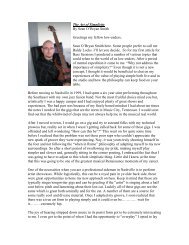
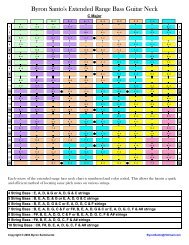
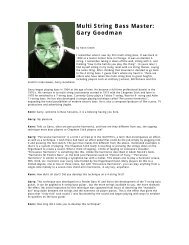
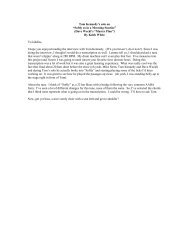
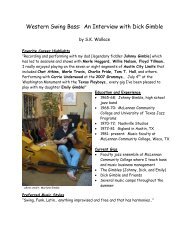
An Interview with Grammy Nominated Bassist Ricky Showalter by S. K. Wallace Preface: Ricky Showalter was one of my earliest influences and bass heroes. My teacher, Bass Sessions Editor John Reid, showed my beginning bass class Ricky's famous "Swimming Laps" exercise that, when properly practiced, is a great way to learn the entire fretboard. [For instance, you map out all the A's on every string for the whole length of the fretboard…then play them in rapid succession. Repeat with all the A#'s/Bb's, B's, C's etc.] Later, in private lessons, Ricky's Liquid Soul CD "Make Some Noise" was a listening assignment, and John did his best to try to teach me to play some licks from that recording. I'll never forget when I actually got to meet Ricky in person a few years ago. It was for a 7:00 a.m. lesson, and there he was: Day-Glo orange, spiked hair; both biceps emblazoned with bass clef tattoos. and he had the spirit, intensity, and outrageous sense of humor to match his personal style. Well, since then, he's changed his hair, but he's still the embodiment of pure bass energy, and he puts the "Fun" in "Funk"! He's not afraid to speak his mind: I've heard him on at least two separate occasions in bass clinics in West Texas [where certain country music styles never die and sometimes a limited number of time-worn progressions seem to predominate] give his opinions and try to convince people to break out of the ageold patterns. When I attended his bass clinic down here in October of this year, Ricky had the audacity to play Stuart Hamm's "Country Music (A Night in Hell)" [and, as far as I know, he hasn't received any stern reprimands, bans from the premises, or death threats… not everyone would be so lucky!] In the process of performing the piece (in which the bass simulates (parodies?) several instruments one would find in a country band), Ricky complimented the "great BANJO tones!" of the high-end custom bass he'd borrowed from John Reid. [John reflexively made a very… interesting… face at the remark.] At the same time, Ricky is extremely down-to-earth, inclusive, and kind. He genuinely wants to help students succeed regardless of their current abilities or levels. An example that comes to mind occurred at Gerald Veasley's Bass BootCamp 2005. Gerald was letting groups of students come up and play at his "Jazz Base" evening jam session, and I decided it was now or never and to go for it… but I really wasn't quite sure what I was doing at the time. Before I could nervously fumble for frets too long, Ricky was suddenly there next to me saying, "Here, play this note! Follow me!" and I somehow found my place by watching him and got through the experience. The bottom line: Ricky Showalter meets people where they are, and, regardless of where that happens to be, they emerge better bassists from associating with him. SKW: How would you describe your musical style? RS: I grew up listening to hard rock/metal (AC/DC, Ozzy, Iron Maiden) then got into Rush and Led Zeppelin. I attended a small college in North Carolina [North Carolina Wesleyan College] and got into jazz, was introduced to music of Stanley Clarke, Jaco, etc. I went on to DePaul University and studied jazz and got my Bachelor of Music (with emphasis in jazz). So, to answer your question I say I'm a little on the funky/heavy side of things. I like big, meaty, solid bass lines that move and support. SKW: Talk about your projects and gigs of note. RS: Bootleg, a hard rock band in Chicago, opened for Collective Soul, Jake E. Lee and other bands of the era: 1990-1992 Mars Williams and Act of God, funk band in Chicago: 1991-1993